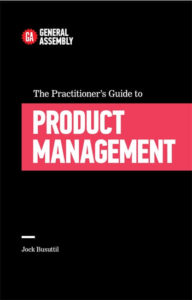
PRODUCTHEAD: Better than okay OKRs
PRODUCTHEAD is a regular newsletter of product management goodness,
curated by Jock Busuttil.
okr computer
tl;dr
Objectives and key results (OKRs) set ambitious goals and track progress towards them
Manage your desired outcomes separately from what you do to achieve those outcomes
Make use of OKRs standard across all teams
Learn from when you fail to achieve your desired outcomes
OKRs go hand-in-hand with team autonomy
a favour: please share this with other product people
every PRODUCTHEAD edition is online for you to refer back to
hello
OKRs — objectives and key results. You’ve almost certainly heard of them, probably experienced them first hand, and the benefits have been … possibly variable?
I find it hard not to look at OKRs and the enthusiastic cheerleading that usually accompanies them without thinking I’m on the receiving end of a hard sell for a scam. Perhaps it’s because they promise so much for a seemingly simple change.
Like any other technique or tool in a product manager’s toolkit, if you can use OKRs effectively in an appropriate situation, you’ll probably see good results. Use them poorly or in the wrong scenario, however, and your results will be atrocious.
It’s a bit like using the wrong size of driver for a screw head. With a bit of brute force and ignorance, you can usually get the screw tightened. But more often than not, you’ll probably strip the head in the process and be left with something that’s done more damage than good. And it will be doubly hard to undo and try again.
Perhaps the reason why everyone seems to be having so much success is that people tend not to blog as much about that time they really screwed up their implementation of OKRs. Pun intended.
Even so, every tech company seems to be either already using OKRs or about to start doing so.
If you’re in the happy situation of having the support of senior management to get started with OKRs, then that’s great news. It hopefully means that everyone is clear on the behavioural changes that typically need to accompany the introduction of OKRs. Just to check:
1. Same rules for everyone
The first behavioural change is that everyone should be playing the same game. If a company is going to adopt OKRs, that means everyone: all the departments, top to bottom — senior management and delivery teams alike.
2. Embrace transparency
This goes hand-in-hand with the second behavioural change, which is to embrace transparency. Founder of Spotify Daniel Ek described it well in a recent interview on The Twenty Minute VC,
“If you want to be a delegating CEO, you have to have a very trusting culture, but also a culture of transparency. Because ultimately, if you’re moving more and more of your decisions to the edges, having the edges know as much as possible about all of the things that are going on will make them be able to make much better decisions than if they’re scrambling to figure out what’s important and what’s not.”
If you’re empowering teams to make their own decisions, then make sure they have as much access to information as the CEO to make those decisions effectively.
Some organisations fail to be wholly transparent. Does everyone, including senior management, publish both their objectives and key results (yes, even if they fell short that quarter), or is transparency only a requirement for delivery teams? Are people allowed to see all OKRs or just those of the level immediate above them?
3. Outputs and outcomes
The third behavioural change is to understand the difference between outputs and outcomes. Companies often fall into the trap of measuring and rewarding outputs, things like ‘number of product releases shipped’ or ‘number of customer service tickets closed’. What they tend not to measure and value are outcomes such as ‘how much easier did this release make it for users to achieve their goal?’ or ‘what proportion of our tickets are we closing without completely solving the customer’s problem?’
Measuring outputs means measuring stuff; measuring outcomes means measuring the hopefully positive impact we’re having on people’s lives.
Adopting OKRs means understanding this difference. Your objectives should probably be mostly outcomes, your key results should be something you can measure that changed specifically because you did something – there’s a causal link.
If our objective was to reduce the average time from order to delivery for customers, we might cause it to happen by speeding up different parts of the process, or even by establishing a distribution centre closer to pent-up demand. These would be the key results we could measure.
Adopting OKRs does not guarantee instant benefits, just like buying a new screwdriver does not make you any better at home improvement. As always, it’s the accompanying mindset you need to adopt alongside the tool, and the experience of knowing when it’s the right tool for the job that yield the results.
To put you on the right track, this week I’ve pulled together some good content explaining how to use OKRs more effectively in your organisation.
Speak to you soon,
Jock
what to think about this week
Set goals with OKRs
Studies have shown that committing to a goal can help improve employee performance. But more specifically, research reveals that setting challenging and specific goals can further enhance employee engagement in attaining those goals. Google often uses “Objectives and Key Results” (OKRs) to try to set ambitious goals and track progress.
[RE:WORK WITH GOOGLE]
4 key lessons I’ve learned about OKRs
This is a post to share my top 4 take aways. These are my key personal learning points — they’re not meant to be a comprehensive list of what you need to know in order to implement OKRs.
[RICHARD MCLEAN / MEDIUM]
Product Management Coaching
Whether you’re new to product management or have been a product manager for years, a coaching session can help you to step up your career.
We’ve coached people wanting to get into product management, product people with nobody in their organisation to manage them, and experienced product managers preparing to apply for a promotion.
We can help you prepare for your product manager interview, including mock interviews.
A proportion of the fees from every coaching session is donated to charity. Just reply to this email if you’re interested in finding out more.
How to make OKRs actually work at your startup
At Swipely, OKRs have become much more than a goal-setting system. They serve as a layer of communication that holds the company together and elevates its game at the same time. And in short order, they’ve become fundamental to Swipely’s culture, helping it hit a record $1 billion in sales under management.
Empowering everyone to take decisions
[FIRST ROUND REVIEW]
The art of the OKR, redux
Like any company, it had its dysfunctions, but I vividly recall how good Zynga was at accomplishing its goals and how it constantly got smarter as an organization. OKRs enabled Zynga to focus many disparate “studios” on what was really important to the company as a whole, empowered those studios to make their own choices on how to realize that strategy and enriched the company with proprietary information that fueled unprecedented growth.
“Failure” can be a positive indicator of stretching
[CHRISTINA WODTKE]
Using OKRs to win at work and in life
OKRs are the hot topic in every team around the globe. What you’re about to learn is how to apply them successfully, both in your work life and to your personal development.
Join Jeff Gothelf, coach, consultant and author of Forever Employable, and Janna Bastow, CEO and Co-founder of ProdPad, as they discuss OKRs and how they can be used at work and in your personal life to keep you focused, motivated and outcome-oriented.
VIDEO: Not for measuring individual performance
[JEFF GOTHELF / PRODPAD]
recent posts
Mission to Mars
Imagine you’ve just been told that you’ll be a member of the team responsible for the first manned mission to Mars.
Now imagine someone asks you how much the mission’s going to cost. The whole thing. There and back. By close of business on Thursday.
[I MANAGE PRODUCTS]
The neverending quest for product-market fit
Often the biggest barrier to your product’s widespread adoption is going to be whether it reaches product-market fit early on. Even if you do, you’re wrong if you think you never need to worry about product-market fit again.
[I MANAGE PRODUCTS]
I’m overwhelmed — can you help?
Hi Jock,
I’m 4 weeks into a new job, having moved states for it, and I’ve recently become a parent for the first time. Currently, I am feeling overwhelmed.
[I MANAGE PRODUCTS]
upcoming talks and events
One of the few silver linings of the recent year is that it’s much easier (and cheaper) to get a product expert to speak at your organisation by video call.
I’m an experienced public speaker, who has spoken at various product management and technology conferences around the world. I share ideas primarily on the topic of product management, and this tends to overlap with agile and ethical product development, digital transformation, and fostering healthy product cultures and communities.
If you’d like to book me to speak at your event, please get in touch.
can we help you?
Product People is a product management services company. We can help you through consultancy, training and coaching. Just contact us if you need our help!
Helping people build better products, more successfully, since 2012.
PRODUCTHEAD is a newsletter for product people of all varieties, and is lovingly crafted from hayfever medication.


Leave a Reply